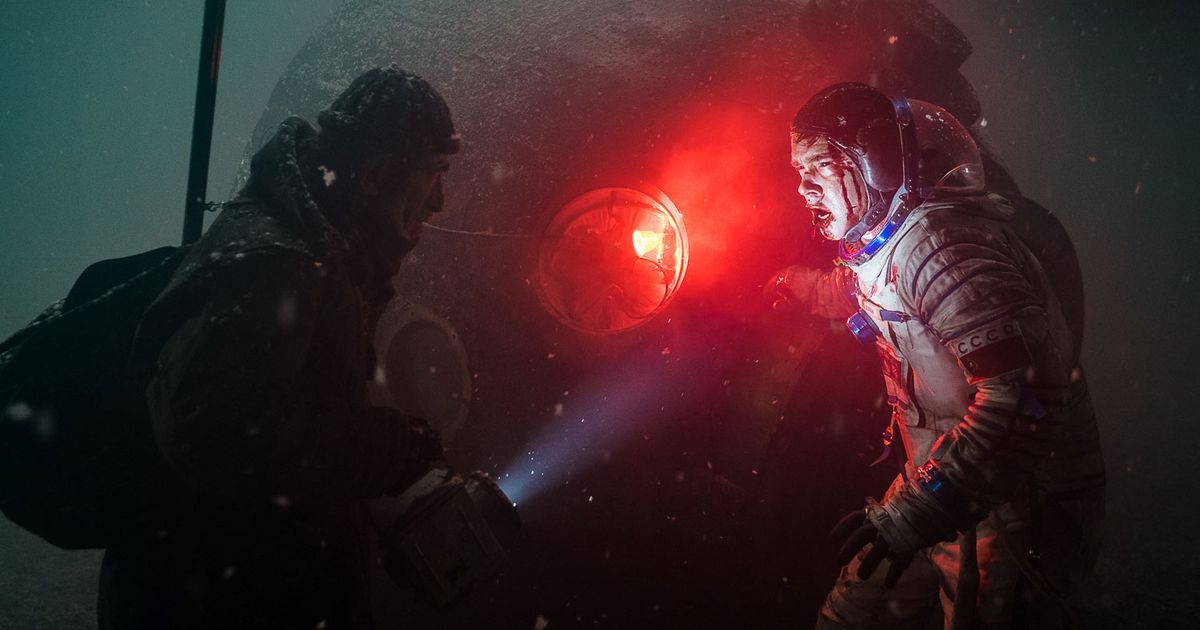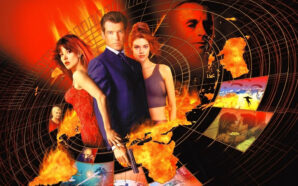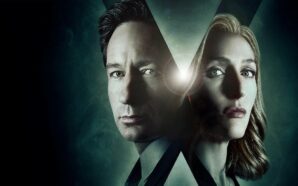Parasite or symbiote? That’s the question at the core of the 2020 Russian chiller Sputnik. In 1984’s Kazakhstan, a space module returns to Earth carrying two cosmonauts, and in turn one of those spacefarers may be carrying something else. Something otherworldly. Confined to a military installation with seemingly no knowledge of his alien companion, cosmonaut Konstantin Veshnyakov is monitored and questioned by Tatyana Klimova, a controversial psychiatrist. As secrets are discovered, agendas revealed, and allegiances made, themes of guilt, control, and parenting come bubbling to the surface before a bloody conclusion. As with the best of science fiction, the alien is a catalyst to explore humanity. The beast within reveals the true beast within.
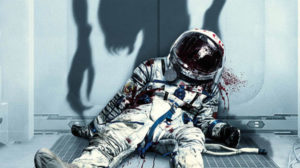 Sputnik does initially feel somewhat familiar. The beginning brings to mind the opening of Arrival, with Tatyana approached by military personnel for a specialist job just like Amy Adams’ character in that film. The pace at which information is revealed also brings to mind Arrival, as well as some of the cinematography and music. Naturally, the idea of aliens growing within humans recalls the Alien franchise, as well as many other films, and roughly 200 different episodes of Star Trek. At one point in Sputnik a computer makes the exact same noise as the Nostromo starting up in Alien so the homage is very much intentional. In short, while a good movie, it does often feel unoriginal. But while we may have seen this type of story before, it’s the setting that feels unique and pushes Sputnik to greater heights than many of its contemporaries.
Sputnik does initially feel somewhat familiar. The beginning brings to mind the opening of Arrival, with Tatyana approached by military personnel for a specialist job just like Amy Adams’ character in that film. The pace at which information is revealed also brings to mind Arrival, as well as some of the cinematography and music. Naturally, the idea of aliens growing within humans recalls the Alien franchise, as well as many other films, and roughly 200 different episodes of Star Trek. At one point in Sputnik a computer makes the exact same noise as the Nostromo starting up in Alien so the homage is very much intentional. In short, while a good movie, it does often feel unoriginal. But while we may have seen this type of story before, it’s the setting that feels unique and pushes Sputnik to greater heights than many of its contemporaries.
Secrecy is always a key component of these kinds of sci-fi thrillers. There’s invariably somebody who knows more than they first let on. A spy for a biotech company; a military officer with dreams of weaponisation; a fellow possessed human. That kind of thing. Just look at Ash in Alien or Burke in its sequel. Those may be the two best examples in the genre. Often this sense of mystery and secrecy becomes a trope. Usually, character motivations are foggy and there isn’t a good reason for characters not to just tell each other what’s going on. It can feel artificial, and only included to create some extra drama in a contrived way. The Soviet setting in Sputnik fixes that.
 Using the Soviet era as a backdrop for the story not only makes the film feel unique but it also enhances the story and its themes. It instantly gives a valid reason for everything to be so secretive and everyone wanting to keep the truth hidden – not only to the outside world but to each other. Information is controlled by the state and its officials, which allows for some great reveals throughout the film about who knew what when and why they were told. Sputnik takes a lead from Chernobyl, but with aliens rather than a nuclear disaster. The film offers the same mysteries and twists as many others but with the vital additional of Soviet context. There are cagey officials who care only for the national reputation of the hero cosmonauts and so lie repeatedly. Everything is to protect “the Party”. Or rather their position in the Party. Nobody is truly honest and everybody is hiding something because that’s the culture they live in, making it the perfect setting for the film.
Using the Soviet era as a backdrop for the story not only makes the film feel unique but it also enhances the story and its themes. It instantly gives a valid reason for everything to be so secretive and everyone wanting to keep the truth hidden – not only to the outside world but to each other. Information is controlled by the state and its officials, which allows for some great reveals throughout the film about who knew what when and why they were told. Sputnik takes a lead from Chernobyl, but with aliens rather than a nuclear disaster. The film offers the same mysteries and twists as many others but with the vital additional of Soviet context. There are cagey officials who care only for the national reputation of the hero cosmonauts and so lie repeatedly. Everything is to protect “the Party”. Or rather their position in the Party. Nobody is truly honest and everybody is hiding something because that’s the culture they live in, making it the perfect setting for the film.
Everything looks so very Soviet too, for lack of a better word. I have no idea if everything was in fact grey with a hint of green in the USSR but that’s often the way it’s presented in movies, TV and video games. And it works. Sputnik is incredibly atmospheric and its locales set it apart from its mostly American contemporaries. Witnessing an alien hunt its prey among the cold, brutalist architecture of concrete and barbed wire was refreshing in a strange kind of way. The film even impressed me with its space-set opening scene, which is incredibly hard to do these days with the amount of science fiction we have. Space actually felt cold and scary. The camera subtly moving in different directions as if floating in space itself was a nice touch. Overall, the film is incredibly well shot. The antithetical image of the space module landing and being greeted by a man on horseback is maybe my favourite of the entire film.
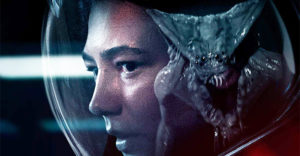 The Soviet-era setting doesn’t just eliminate all of Sputnik’s flaws however. On more of a superficial level, the music is trying to imitate a modern Hans Zimmer-esque score but often feels a little… much. “A couple of cars driving down a road? Let’s blast those horns at full volume!” But, more significantly, it does feel at times like the filmmakers have placed all these themes and ideas into the movie, shaken it all up for most of the runtime, and then released the messy results in the last ten minutes, albeit with an enjoyable flourish and big bucket of blood. Overall, I did enjoy the film and the journey of lies and half truths it takes you on, but the destination falls a little flat.
The Soviet-era setting doesn’t just eliminate all of Sputnik’s flaws however. On more of a superficial level, the music is trying to imitate a modern Hans Zimmer-esque score but often feels a little… much. “A couple of cars driving down a road? Let’s blast those horns at full volume!” But, more significantly, it does feel at times like the filmmakers have placed all these themes and ideas into the movie, shaken it all up for most of the runtime, and then released the messy results in the last ten minutes, albeit with an enjoyable flourish and big bucket of blood. Overall, I did enjoy the film and the journey of lies and half truths it takes you on, but the destination falls a little flat.
Maybe there are a bunch of these Russian-produced, Soviet-era-set sci-fi movies but after many disappointments coming out of Hollywood over the past few years I found Sputnik to be an invigorating experience. A film where the time and place it’s set allows it to transcend not just its own flaws but issues surrounding artificial mysteries that plague the genre as a whole.
Sputnik is available to watch on Netflix in the UK.
Have you seen Sputnik? Are there any other Russian movies you would recommend? Let me know in the comments and be sure to geek out with me about TV, movies and video-games on Twitter @kylebrrtt.




